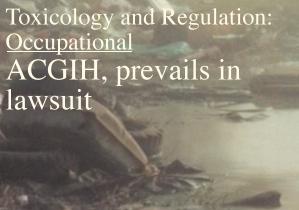 |
||
Community |
||
Environmental |
||
Occupational |
||
CALENDAR |
||||||||||||||

Regulation

The American Conference of Governmental Industrial Hygienists (ACGIH) is a private organization that establishes Threshold Limit Values (TLV; trademarked) for chemicals used in the work place. These TLVs are used by governments world-wide, including the U.S. government (OSHA and NIOSH), to set their own standards. A law suit was brought in Federal District Court in Macon, Georgia by an industry organization, the International Brominated Solvents Association (IBSA) to stop publication of TLVs for 1-Bromopropane, copper, silica and diesal particulate matter. Plaintiffs claimed that such TLVs were false and misleading and should not be allowed to be published, as they would interfere with business. It also claimed that as a government advisory committee ACGIH was required to follow the provisions of the Federal Advisory Committee Act (FACA) and of the Administrative Procedures Act (APA), which it failed to do. While the court was unclear as to whether plaintiffs established a claim under the deceptive trade practices argument and so is allowing that to proceed to discovery, it also ruled that a private claimant can not bring an action under FACA; that ACGIH is not a Federal Agency and so is not covered under APA; and there was no indication that publishing TLVs would interfere with business. All three such claims were dismissed. As far as the deceptive trade practices claim that was allowed to proceed for a time, the court emphasized that ACGIH has first amendment rights to publish TLVs unfettered and that preventing it to do so would be impermissable prior restraint.
The court's prompt dismissal of 3 of the 4 counts is important, as ACGIH standard setting process is often contentious, with various interest groups vying for their position to prevail. The final result is often a compromise of risk/benefit, which many who consider that risk should be the primary basis of standard setting claim that instead industry concerns of financial costs of stricter standards usually prevail. Obviously, this was one case in which the industry did not believe their position was sufficiently heard and taken into account. That they would have attempted to control the process through a court imposed injunction would have greatly altered the process had it succeeded. It remains to be seen what effect the law suit against ACGIH and this outcome will affect its position in future negotiations over TLV-setting.
